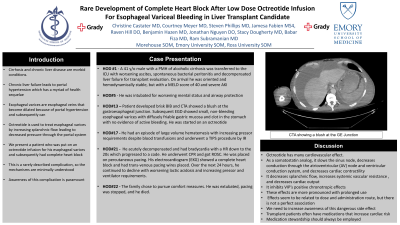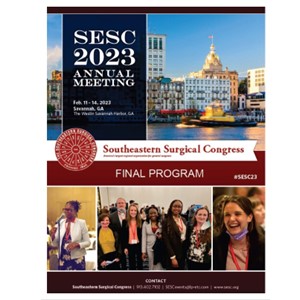Back

HPB
Category: Quickshot Oral Session 12
Quickshot Oral : Quickshot Oral Session 12
RARE DEVELOPMENT OF COMPLETE HEART BLOCK AFTER LOW DOSE OCTREOTIDE INFUSION FOR ESOPHAGEAL VARICEAL BLEEDING IN LIVER TRANSPLANT CANDIDATE
Sunday, February 12, 2023
7:00am – 8:00am East Coast USA Time


Raven Hill, DO
Surgery Resident PGY 2
Morehouse School of Medicine
Christine Castater, MD MBA
Trauma Acute Care Surgeon
Wellstar Kennestone, United States
Presenter(s)
Principal Contact(s)
Objectives: Cirrhosis and chronic liver disease is most commonly caused by alcohol use, hepatitis C, or nonalcoholic steatohepatitis (NASH) and leads to significant morbidity and mortality. All of the sequelae of chronic liver failure is the result of portal hypertension. Esophageal varices are esophageal vein that become dilated because of back pressure from the portal circulation. A common complication which is seen by general surgeons is esophageal rupture and bleeding. Treatment for esophageal variceal bleeding includes antibiotics, octreotide, and esophagogastroduodenoscopy (EGD) with variceal banding. Octreotide inhibits glucagon, which is known to increase splanchnic flow. By doing this, octreotide reduces both the flow and pressure through the portal and splanchnic systems leading to a reduction in variceal pressures. We present a case of a patient who was put on an octreotide infusion for his esophageal varices and who subsequently had complete heart block. This is a rarely described complication so the mechanisms are minimally understood. Because octreotide is a mainstay in the treatment of esophageal varices, awareness of this complication is paramount.
Methods:
Results:
Conclusion:
Methods:
Results:
Conclusion:

